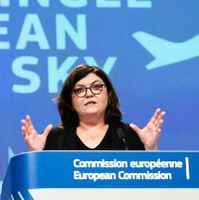(BRUSSELS) – The EU Commission put forward a proposal Tuesday to upgrade the Single European Sky regulatory framework, with more modern management of European airspace and more sustainable and efficient flightpaths.
The proposal comes as the sharp drop in air traffic caused by the coronavirus pandemic calls for greater resilience of our air traffic management, by making it easier to adapt traffic capacities to demand.
“Planes are sometimes zig-zagging between different blocks of airspace, increasing delays and fuel consumed,” said the Transport Commissioner Adina Valean: ” An efficient air traffic management system means more direct routes and less energy used, leading to less emissions and lower costs for our airlines.”
The proposal would also also stimulate digital innovation by opening up the market for data services in the sector, she added.
Not adapting air traffic control capacities would result in additional costs, delays and CO2 emissions. In 2019, delays alone cost the EU 6 billion, and led to 11.6 million tonnes (Mt) of excess CO2. Meanwhile, obliging pilots to fly in congested airspace rather than taking a direct flight path entails unnecessary CO2 emissions, and the same is the case when airlines are taking longer routes to avoid charging zones with higher rates.
The European Green Deal, but also new technological developments such as wider use of drones, have put digitalisation and decarbonisation of transport at the very heart of EU aviation policy. However, curbing emissions remains a major challenge for aviation. The Single European Sky therefore paves the way for a European airspace that is used optimally and embraces modern technologies. It ensures collaborative network management that allows airspace users to fly environmentally-optimal routes. And it will allow digital services which do not necessarily require the presence of local infrastructure.
To secure safe and cost-effective air traffic management services, the Commission proposes actions such as:
- strengthening the European network and its management to avoid congestion and suboptimal flight routes;
- promoting a European market for data services needed for a better air traffic management;
- streamlining the economic regulation of air traffic services provided on behalf of Member States to stimulate greater sustainability and resilience;
- boosting better coordination for the definition, development and deployment of innovative solutions.
Single European Sky upgrade - Q&A



